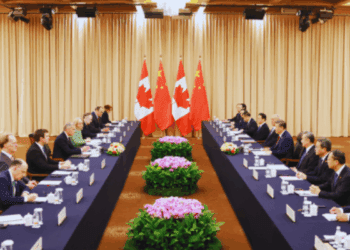Canada should welcome foreign investment, be wary of state-owned enterprises
MEDIA RELEASE
OTTAWA, June 6, 2012 – Should BlackBerry maker RIM be targeted by foreign investors, the Canadian government will face tough choices regarding net benefits to Canada and implications for national security, argues Laura Dawson, an international policy analyst, in a paper released today by the Macdonald-Laurier Institute.
In a commentary entitled Potash and BlackBerries: Should Canada treat all foreign direct investment the same?, Laura Dawson argues while the sale of Canada’s flagship intellectual property (IP) company to a foreign entity might do “symbolic damage” to the country’s image, Canada’s national pride “would certainly survive the end of RIM.”
With BlackBerry’s U.S. market share dropping from 14 to eight per cent in one year, international companies such as Microsoft, Nokia, Amazon, Samsung and Icahn have been touted as potential suitors but few have expressed interest in acquiring the whole company. It is likely, she writes, that RIM would be broken up and its IP assets — worth an estimated $4 to $5 billion — would be auctioned off. Dawson predicts that there will be vocal demands on Ottawa to try to protect the firm, “but sometimes nationalism comes at a cost.”
Comparing RIM’s potential sale to the breakup of another high-tech giant, Nortel, she noted that RIM’s former co-CEO Jim Balsillie argued that Nortel ought to remain in the hands of Canadians but, in the end, RIM was only able to acquire Nortel assets by joining a consortium that included US-bidders Apple and Microsoft. Dawson argues, “Not every Canadian asset is a national treasure that must be guarded from foreign hands. Sometimes we must take the best deal available.” She contrasts Nortel with Saskatchewan’s Potash Corp. where the government intervened to block a hostile takeover by BHP Billiton because the proposal failed to meet the net-benefits test. “In those cases where we do have a high-demand asset, it makes sense to hold out for the best deal possible. ”
For most types of foreign acquisition, Dawson argues, the current provisions for foreign investment screening in the 1985 Investment Canada Act (ICA) adequately balance public policy and economic interests while keeping restrictions on private commercial decisions to a minimum.
When considering a proposed sale, the government considers the net benefits offered by the acquisition, including the extent of Canadian content, significance of Canadian participation, effects on economic capacity, compatibility with industrial, economic and culture policies, and effects on domestic competition. The BHP Billiton offer was excluded because even though the company offered numerous concessions, investment promises and community spending, the purchase would have led to the demise of Canpotex, Canada’s enormously powerful potash export cartel, and cost Saskatchewan an estimated loss of $3 to $6 billion in provincial tax revenue.
Ownership matters
Dawson does argue, however, that it is vital to differentiate between private foreign investment and those from state-owned enterprises (SOE), such as the Chinese companies investing in Canada’s resource sector. SOEs may put the interests of their home country ahead of commercial objectives, Dawson writes, and allowing them to purchase Canadian assets may allow some foreign powers to gain advantage through “nefarious means”. Although Canada cannot point to cases where a Chinese foreign investor has ignored commercial consideration to act as a puppet of the Communist Party, “all the senior appointments to Chinese SOEs are made by the state.”
Dawson points out that the addition of new Canadian rules in 2007 and 2009 that provide closer scrutiny on SOEs and more attention to national security issues, make the ICA more robust but these rules are new and relatively untested. If RIM were to be broken up, it is likely that given the widespread use of BlackBerry technologies by the US government (including the US military), the United States would pressure Canada to apply the stricter security standards used by the U.S. to ensure that RIM’s IP does not fall into the ‘wrong hands.’
The US Committee on Foreign Investment in the United States looks at three broad criteria: acquisitions that would make the home country dependent on a foreign-controlled supplier for services critical to the home economy; a transfer of technology that could be used to harm the home country’s national interests; and any sale that would allow infiltration, surveillance or sabotage of the home economy.
Overall, Dawson argues, Canada’s rules for governing foreign investment are adequate to balance public policy concerns regarding national security and foreign ownership in sensitive sectors with economic growth and competitiveness. “However, our FDI decisions must be based on a confident assessment of interests, not fear of foreigners.”
Laura Dawson is President of Dawson Strategic, and has more than 15 years of experience providing advice to government officials on trade and economic issues in the United States, Canada, Latin America, Russia and CIS, and China. She is a Senior Fellow at the Macdonald-Laurier Institute.
For more information or to arrange interviews, please contact Tripti Saha at tripti.saha@macdonaldlaurier.ca or call (613) 482-8327, ext. 105.
The Macdonald-Laurier Institute is the only non-partisan, independent national public policy think tank in Ottawa focusing on the full range of issues that fall under the jurisdiction of the federal government. www.macdonaldlaurier.ca




